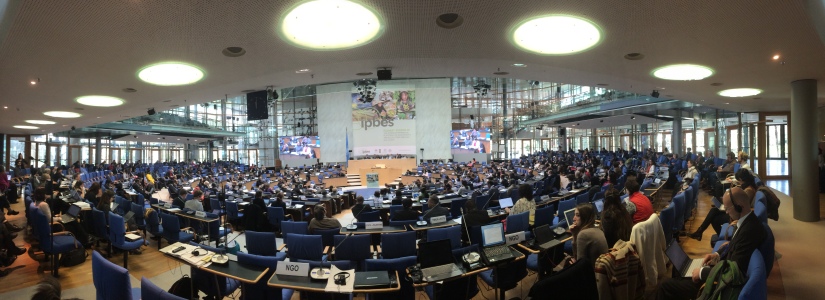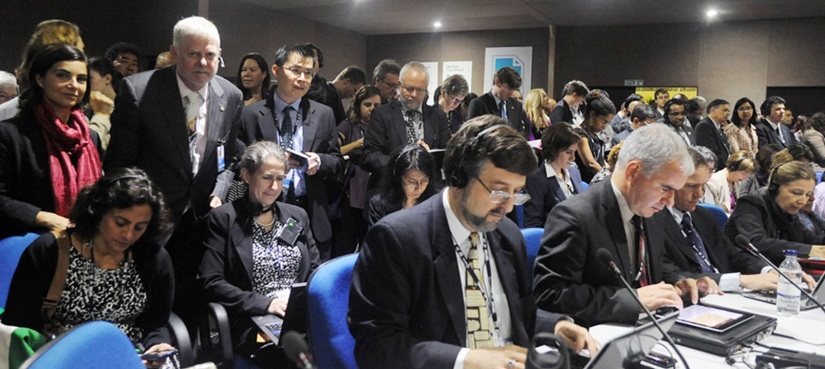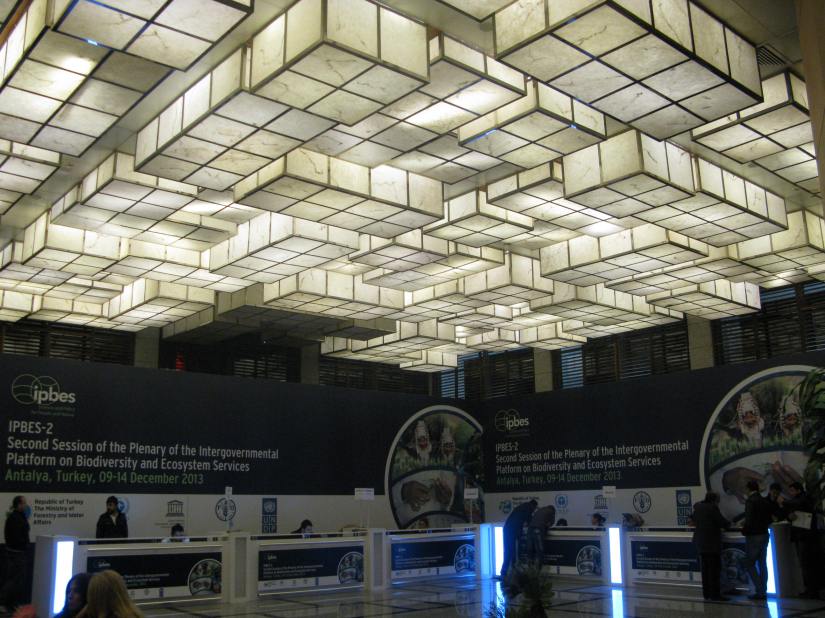
Across virtually all indicators, biodiversity loss continues to worsen at a planetary scale. From species extinction and habitat loss to deforestation and desertification, from overharvesting and invasive species to pollution and climate change, conservationists perceive an increasingly dire situation. Over the past two decades, this growing sense of socio-ecological crisis and institutional failure among conservationists has prompted many to look with a renewed urgency toward new concepts, new strategies, new allies, and ultimately a new way forward for conservation.
Since the 1990s, the conceptual framework of ecosystem services has been asserted as offering that new way forward. The Millennium Ecosystem Assessment (MA) defines ecosystem services simply as “the benefits people obtain from ecosystems.” The concept expresses in measurable, often monetary terms the economic values encompassed in biodiversity: mangos, timber, drinking water, flood protection, weekend hikes, pharmaceuticals, and so on ad infinitum. The MA sorted these services into what became a classic four-category typology: (i) provisioning services like food, fresh water, or fibre, (ii) regulating services like climate, flood, and disease attenuation, (iii) supporting services like nutrient cycling, primary productivity, and soil formation, and (iv) cultural services such as aesthetic, spiritual, educational, or recreational fulfilment.
Together, these categories express a particular way of making sense of nature, a framework for reimagining biodiversity that tries to systematize and quantify the value of the services that ecosystems deliver. By rendering nature economically legible, proponents of ecosystem services endeavour to make previously taken for granted “invisible” costs and benefits related to ecological change finally and incontrovertibly “visible.”
The emergence of ecosystem services discourse has sustained, and been sustained by, a rapidly growing community of research and practice that seeks to disseminate this framework into the politics, cultures, and choices of global conservation and development governance. Diverse communities of practitioners around the world have responded and increasingly come to accept and even to embrace the concept: ecologists and economists, policymakers, activists of varying stripes, intergovernmental bureaucrats and business leaders are together learning to think about “nature” as stocks of “natural capital” assets generating flows of valuable services. A discernable vision for environmental governance, articulated through the vocabulary of natural capital and ecosystem services, now permeates international dialogues and discussions. Amidst growing concern that traditional conservation approaches have “failed,” conservationists now turn to ecosystem services to save biodiversity.
As the influence of ecosystem services thinking has grown, political clashes around it have also intensified: what does it mean to put a monetary value on nature? The rise of ecosystem services has provoked tremendous debate among environmental advocates.
Proponents of ecosystem services highlight the potential of ecosystem services to strengthen the legitimacy of arguments advocating for the protection of nature, to improve tools for rational decision-making (such as cost-benefit or trade-off analysis), and to operationalize policy instruments such as forest carbon markets and a wide array of PES schemes. For its supporters, ecosystem services promises new arguments (e.g. the ‘business case for nature’) new allies (e.g. powerful constituencies amenable to market discourse), new resources (e.g. public and private finance streams enabled by ecosystem services arrangements), and a powerful framework for aligning conservation with the multiple priorities and creation of a “green economy.”
Yet critics raise strategic, methodological, ethical, and political concerns. They perceive ecosystem services as a dangerously narrow re-conceptualization of the aims of biodiversity conservation. The theoretical underpinnings of ecosystem services, they argue, fail to adequately address difficult-to-quantify non-market values in biodiversity, which, as one (in)famous critique argued, “is to imply—intentionally or otherwise—that nature is only worth conserving when it can be made profitable.” They charge that abandoning the goal of saving nature for nature’s sake, brushes aside intrinsic values, ethical duties, and the sense of aesthetic or spiritual connection to living things historically ingrained in conservation’s ideals.
Politically, critics disparage the concept as complicit with, if not an outright vehicle for, the commodification of nature and the neoliberalization of environmental governance. It represents, they argue, a nearly archetypal example of the “neoliberalization” of environmental governance which both reflects and serves to reinforce an ongoing re-purposing of conservation around global capitalism. In short, these critics argue, the paradigm is as beguiling as it is pernicious–a “prelude to the greatest privatization since enclosure”–it amounts to “ced[ing] the natural world to the forces wrecking it” and a “neoliberal road to ruin” that will exacerbate social inequalities, result in further dispossession and marginalization, and accelerate the causes of environmental degradation.
As these controversies continue to swirl around the concept, the idea of ecosystem services has already manifested around the world in a range of forms including Payment for Ecosystem Services (PES) programs; natural capital accounting standards (e.g. the UN’s recently-revised System for Environmental-Economic Accounting, SEEA); new academic journals (e.g. “Ecosystem Services,” inaugurated in 2012); and a proliferation of new research initiatives and communities of practice (e.g. the Natural Capital Project, Ecosystem Services Partnership, ecoSERVICES, ValuES, OpenNESS, OPERAs, Invaluable, Katoomba Group, DIVERSITAS, Ecosystem Marketplace, etc.). The concept is now firmly rooted in global biodiversity research networks and agendas; among national and sub-national state environmental bureaucracies in both developed and developing countries; in the communications, organizational development strategies, and project planning of the conservation establishment (e.g. in the so-called ‘big three’ conservation organizations, World Wildlife Fund, The Nature Conservancy, and Conservation International, among many others); in various intergovernmental processes undertaken through the United Nations; in the World Bank (e.g. in their Wealth Accounting and Valuation of Ecosystem Services, or WAVES, global partnership); and in other large multilateral science-policy initiatives such as the Millennium Ecosystem Assessment (MA) completed in 2005, The Economics of Ecosystems and Biodiversity (TEEB) established in 2007, and the Intergovernmental Platform on Biodiversity and Ecosystem Services (IPBES) established in 2012.

IPBES represents one prominent crystallization of these past two decades of transnational consensus-building around ecosystem services policy discourse. The process has enrolled over a hundred member states (124 at present) and a thousand biodiversity and ecosystem services experts to its cause. IPBES aspires to be a kind of ‘IPCC for biodiversity’, tasked with further transforming knowledge about global ecosystems into global action to conserve ecosystems. Analogously to the IPCC, IPBES is intended to synthesize current scientific knowledge (alongside an intriguing commitment to integrating other knowledge systems) regarding biodiversity and ecosystem services and to disseminate that knowledge through a series of comprehensive assessments. Still a young organization, IPBES has focused on defining and operationalizing its mandate, building capacity for its core functions, and coordinating the expert groups responsible for preparing its first set of assessments, which will be reviewed for approval by member states at the fourth IPBES Plenary (IPBES-4) in February 2016 in Kuala Lumpur, Malaysia.
Understood as a social process, initiatives like IPBES represent a pivotal nexus of actors, institutions, and ideas. Its constitutive processes—in particular, meetings—assemble these elements together in observable moments in space and time which connect through transnational policy networks to other such moments. It is through such sites that global environmental governance is produced and the project to “mainstream” ecosystem services is mobilized.

These sites are in important ways also uniquely visible and accessible to researchers and other stakeholders. Using IPBES as one of its case studies, and building on previous experience as part of a “Collaborative Event Ethnography” research team studying these dynamics, my dissertation analyzes the rise of ecosystem services through the perspectives, experiences, and dilemmas of its advocates. In this approach, each of the various ‘moments’ that comprise IPBES can be thought of as
a node in a network of global environmental governance: they are sites of negotiation and decision-making in ongoing, broader policy-making processes, where we can examine how ideas about conservation emerge, gain traction, and are contested, debated, and traded-off. By attending such events as a group of researchers, we gain insights into the processes at stake in determining what conservation is, who participates in such processes, and with what consequences [link]
Applying this approach to IPBES opens up some interesting possibilities, including the prospect of directly studying the ways in which the Platform’s institutionalization has served as a site of epistemic struggle—an arena of ongoing contestation where broader tensions among conservationists over the political meaning and political implications of ecosystem services are literally being negotiated. These clashes surrounding ecosystem services—particularly over how to accommodate divergent approaches to value and valuation—quickly manifested within the process and have played an important role in shaping the Platform’s mandate, conceptualization, and overall character. The negotiation of these tensions are central to my analysis.

Using participant observation and embedded organizational ethnographic research inside IPBES, my research examines efforts by a variety of actors operating within the process to steer its institutionalization away from dominant political-economic and epistemic frames. Extending theoretical frameworks from political ecology, science and technology studies, and critical and sociological variants of institutional theory, I seek to understand the strategies, ambivalences, challenges, and counter-hegemonic potential of these actors as they try to contest the character of this emerging institution and wrest the political meaning of ecosystem services discourse from its more narrowly economistic integuments and neoliberal articulations. I explore the prospect (and acknowledged challenges) of coalition-building among activists, critical scholars, and conservation scientists, and the extent to which the apparently ascendant yet much-maligned vision for ecosystem services as a vehicle for neoliberal conservation can be dislodged and replaced by something more alternative, more progressive, and more radical.
Excitingly, these questions remain subject to ongoing contestation, contingent upon continuing political, epistemic, and institutional negotiations both within and outside of the IPBES process. As IPBES struggles to bend—without breaking—traditional science-policy routines and involve diverse value systems, counter-hegemonic politics, and social scientists capable (sometimes) of translating these incongruent knowledges into the process in a meaningful and robust way, those traditionally wary of the perils of ecosystem services face a conundrum: whether, how, and in what ways to engage this experiment. Does participation risk co-optation, perpetuating the underlying power relations and reinforcing the political-economic conditions that have so effectively disciplined conservation in recent decades and contributed to the turn to ecosystem services? Or, does the institutional expression of ecosystem services discourse constituted by IPBES perhaps represent something more mutable and ripe with possibility: a conjunctural moment and window of opportunity that can be appropriated and leveraged toward transformative change?
This research was initiated and continues in large part thanks to generous financial assistance from GDF (through a GESA Alumni Innovation Fund Grant), and with valuable support from fellow GESA alumni Katja Heubach. This blog post was prepared for GESA and will appear on their website.
